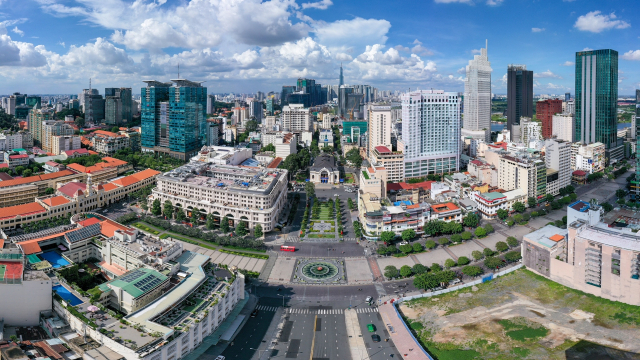Leader Talk
Vietnam in a league of its own post Covid-19 pandemic
Although Vietnam can sit on its advantages after Covid-19, the country should not let reforms slip its mind.
“On many levels, Vietnam is singing its own song”, said Yun Liu, ASEAN economist of HSBC Global Research. The country has successfully flattened the Covid-19 curve, nearly eliminating the virus thanks to proactive containment efforts and a timely policy response.
Credible handling of the pandemic has already precipitated an economic recovery. Domestic consumption is rebounding sharply, in particular domestic travel, and even international tourist arrivals are likely to rebound quicker than peers.
What is more, the country continues to attract impressive foreign direct investment commitments, and the recent ratification of the free trade agreement with the EU should help revive trade with the country’s second largest export market.
In short, Vietnam’s story was already a bright one in emerging markets, but deft handling of Covid-19 has now put the country in a league of its own.
Liu stated that while not a huge economy, Vietnam’s rapid recovery offers valuable insights for a world struggling with how to engineer an urgently-needed growth revival.

What has made the Vietnamese story such a positive one started with the swift containment measures. The government officially declared a public health emergency as early as 1 February when the country only had a total case load in the single digits. It also tightened border controls and travel restrictions as the virus started to spread globally. Meanwhile, it imposed strict quarantine measures and used apps for contact tracing.
When daily cases surged in late March, the government imposed a three-week nationwide lockdown. The measures were unprecedented, but the proactive efforts paid off. With a little over 300 confirmed cases and no deaths so far, Vietnam has one of the lowest infection rates in Asia.
The economic cost is inevitable. Exports have fallen at a double-digit pace for two consecutive months, dragged down by a drop in garment and smartphone shipments. What is more, domestic demand has also been severely impacted by the lockdown, with retail sales receding considerably from the rapid expansion in the last few years.
However, the successful containment story buys Vietnam time to recover ahead of others. It is one of the earliest countries to lift social restrictions and gradually resume economic activity. And the public approval rating for the government’s handling of Covid-19 is the highest among all countries featured in a recent YouGov poll. It is thus not surprising to see how consumer confidence has transmitted to nascent signs of a domestic recovery.
Mobility wise, Vietnam is almost back to normal, leading to a quick rebound in retail sales last month. Meanwhile, all domestic flights by Vietnam Airlines have been resumed, almost reaching the same level as in 2019.
While Vietnam’s border restrictions are still in place for foreign tourists, its solid handling of the pandemic may give it a first-mover advantage when the border re-opens. The tourist industry has been calling for the promotion of ‘safe tourism’ to attract international travellers.
At the same time, the government is in discussions with neighbouring countries, like Japan, on the next steps. It has even announced that it will grant e-visas to citizens of 80 countries from 1 July, although more details need to be unveiled given the existing border controls. After all, 80 per cent of Vietnam’s tourists come from Asia so reviving regional tourism would be a huge boost for its subdued tourism sector.

In addition, there has even been more good news recently on the trade front. The long-awaited EU-Vietnam Free Trade Agreement (EVFTA) was passed by Vietnam’s National Assembly on 8 June and is expected to come into force soon. The deal has come just in time given Vietnam’ exports to the EU were hit hard. It will not only boost trade with the EU due to tariff reductions, but also help attract more high quality foreign direct investment to the country.
There may be more good news if the Regional Comprehensive Economic Partnerships (RCEP), the world’s largest trade pact if realized, can be signed by this year.
Despite the risk of deglobalization, export-driven Vietnam understands the significance of a closely entwined global economy and thus is doing whatever it can to facilitate open trade. A sustained widening of the trade surplus has supported Vietnam’s balance of payment position in recent years, strengthening its ability to withstand external shocks. This equips the country with better protection in terms of currency stability and the central bank’s flexibility to deploy monetary easing.
This all does not mean Vietnam can sit on its advantage. While the above may sound too good to be true, there are of course lingering issues that need to be rectified, Yun Liu noted.
Vietnam should not let reforms slip its mind. For one, vulnerabilities in the banking sector need to be addressed, given its thin capital buffers and rising consumer leverage. Meanwhile, upgrading infrastructure remains a priority, which is why the highly anticipated revised Public-Private Partnerships Law is needed to encourage private investor participation.
“But overall, it is a positive story for Vietnam, making itself stand out among emerging markets. It should use this opportunity to continue pursuing its reform agenda. How to weather Covid-19 and manage a swift recovery are on the top of all policymakers’ minds. Perhaps we can all learn something from Vietnam’s experiences”, Liu said.
How hospitality industry adapts to the post-pandemic tourism
Vietnam turns semiconductor vision into action
The global semiconductor industry is being reshaped by geopolitical tensions, shifting supply chains, and the surge of digital technologies.
Cutting red tape in APA approvals to speed up tax negotiations
The change in APA approval authority is expected to shorten processing time and enhance business proactiveness in international tax negotiations.
Enterprise cybersecurity is under threat from the inside
As hybrid cloud systems grow more complex, Vietnamese enterprises are struggling to detect cybersecurity threats moving laterally within their own networks.
Breakthrough for the international financial center ambition
The submission of the draft resolution on Vietnam’s international financial center to the National Assembly heralds a new developmental era for the country.
How leadership philosophy redefines hospitality in Nha Trang
More than just running a 5-star resort, Kristian Petersen is redefining the art of hospitality with a humane and sustainable leadership philosophy.
When organic becomes an inspiring wellbeing lifestyle
For Tyna Huynh, co-founder of Drinkizz, organic is not just a food choice but a way of life that fosters a deep connection between people, nature and community.











































